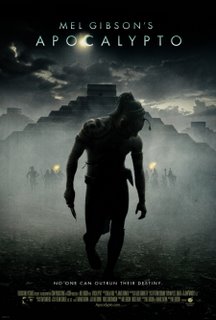Thursday, January 11, 2007
Apocalypto

Let me start with the good things about this movie, of which there are many.
This is a great film. I was blown away.
Movies like this are the reason the cinematic form was invented. Watching this movie did not feel like watching a movie; it felt like virtual reality or like peering through a time portal.
So lavish were the production values, so thoroughly-researched and authentic were all the details that I really felt like I was seeing real people from another time.
A major part of this achievement was Gibson's much criticized technique of filming period movies in their original languages with subtitles. Not only does this enhance the feeling of authenticity of the film, it also enhances the acting. Since the actors don't have to worry about sounding real - since no one can tell what they are saying anyway - they can instead focus all their energy on acting real.
In case you haven't heard the buzz, this film is basically about a clash of cultures in pre-European South America. A primitive tribe is ravaged by the greed of a "civilized" culture. This conflict ultimately boils down to a life-and-death race through the jungle between two men, a tribal prince (named Jaguar Paw) and an imperial general, who come to represent all the strengths and weaknesses their respective cultures.
This film, I feel, performs a great service to the human race by meticulously documenting what we know about mesoamerican civilization. Of all the major ancient civilizations, that is the one most people know the least about. The fact an entire continent full of advanced civilizations was wiped out due to greed and ideology was truly a crime against humanity. It is fitting that this culture at last receive such a lavish tribute.
I think what impressed me most about this movie was its wise and nuanced depiction of the human animal. Like all truly great art, this movie sees humans for what they are: a group of apes who became too smart and too greedy too fast. The movie shows the human capacities for love, skill and creativity. It also stares unblinkingly into the profoundly ugly face of human greed, cruelty and sheer madness.
In one series of scenes, a group makes its way from the jungle towards the city. The road to the city depicts the gradual evolution of technology and society. The closer they get to the city, the more technology people use, the more clothes they wear, the more art they create. But, most importantly, the closer they get to the city, the more insane, corrupt and decadent people behave.
To be sure, this movie is not for the squeamish. There is a lot of gory violence. Still, this is a masterful, important film and everyone should make an effort to see it.
OK, there's all the good stuff. Now for the criticisms. This movie is not subtle. It hits you over the head with its message pretty heavily. Near the start of the movie, I was impressed by the irony of the fact that mesoamerican civilization oppressed and exploited other less advanced cultures. But the movie isn't content to let the viewers figure that irony out on their own. Towards the end of the film, Gibson beats us over the head with it. And just for good measure, there is a scene where a tribal elder tells an ancient fable, which of course delivers the moral of the film in the simplest possible terms, just so there is no chance that anyone in the audience will miss it.
This film also gives new meaning to the theatrical term deus ex machina. Jaguar Paw is repeatedly rescued from certain doom by the most outlandish miraculous events. Combined with the fact that this is basically a chase movie, these improbable rescues made me think I was watching some sort of mesoamerican version of the Roadrunner cartoon. There was one point in the movie where I completed expected to see the Acme logo.
Please, dear readers, keep in mind that this is a serious and thoughtful film. When you see this movie and you see the scene I'm talking about, please do not laugh out loud. And , once the chase scenes start, please please do not allow the Roadrunner music (dat dada dat dada dada) to creep into your brain. It would be such a shame if that happened. ;-)
Ultimately, these criticisms are pretty picky and technical. The long and the short is that this is an important film. While Gibson may be a loon and a bigot in real life, he is proving himself to be a great cinematic craftsman. It is, I suppose, ironic that greatness and ugliness should be so evident in Gibson's life, since this film helps show us that these are the common qualities of the whole human race.
posted by Mentok @ 9:10 PM,
![]()

